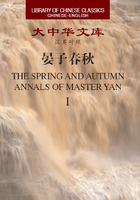
1.18 [18] 景公游公阜一日有三过言晏子谏
齐景公到公阜巡游一天之内有三次错误的言辞,晏子进谏
【原文】
景公出游于公阜,北面望睹齐国,曰:“呜呼!使古而无死,何如?”晏子曰:“昔者上帝以人之殁为善,仁者息焉,不仁者伏焉。若使古而无死,丁公、太公将有齐国,桓、襄、文、武将皆相之,君将戴笠衣褐,执铫耨以蹲行畎亩之中,孰暇患死?”公忿然作色,不说。无几何,而梁丘据(御)〔乘〕六马而来,公曰:“是谁也?”晏子曰:“据也。”公曰:“何〔以〕(如)〔知〕〔之〕?”曰:“大暑而疾驰,甚者马死,薄者马伤,非据孰敢为之?”公曰:“据与我和者夫!”晏子曰:“此所谓同也。所谓和者,君甘则臣酸,君淡则臣咸。今据也(甘君)〔君甘〕亦甘,所谓同也,安得为和!”公忿然作色,不说。无几何,日暮,公西面望,睹彗星,召伯常骞,使禳去之。晏子曰:“不可!此天教也。日月之气,风雨不时,彗星之出,天为民之乱见之,故诏之妖祥,以戒不敬。今君若设文而受谏,谒圣贤人,虽不去彗,星将自亡。今君嗜酒而并于乐,政不饰而宽于小人,近谗好优,恶文而疏圣贤人,何暇在彗,茀又将见矣!”公忿然作色,不说。及晏子卒,公出(背)〔屏〕而泣曰:“呜呼!昔者从夫子而游公阜,夫子一日而三责我,今谁责寡人哉?”
【今译】
1.18 [18] DUKE JING MADE THREE MISTAKES IN HIS SPEECH DURING A SINGLE DAY WHEN HE W ENT ON A PLEASURE EXCURSION TO GONGFU.[1] YANZI REMONSTRATED.[2]
Duke Jing went on a pleasure excursion to Gong-fu. Looking northwards,he saw the capital of Qi and said: “Oh,if from ancient times no death had existed—what would that be like?”
Yanzi said: “In the past,the God on High considered it good that people passed away—the humane find respite in death and the inhumane submit to it. If no death had existed since ancient times,then Duke Ding and Duke Tai would still have the state of Qi,and Dukes Huan,Xiang,Wen and Wu would be its Chief M inisters.[3] You,my Lord,would wear a bamboo hat and a coarse woolen garment and would be going through the fields stooped over hoe and weeder. How much time would you have then to worry about dying?”[4]
The Duke flushed w ith anger; he was displeased.
A fter a little while,Liangqiu Ju arrived in a chariot w ith six horses.
The Duke said: “Who is this?”
Yanzi replied: “It is Ju.”
The Duke said: “How do you know that?”
Yanzi replied: “If one drives horses at full gallop during the Greater Heat,[5] then at worst,the horses w ill die and,at best,they would be injured. Who then other than Ju would presume to act so?”
The Duke said: “Ju and I are in harmony with one another—is it not so?”
Yanzi answered: “This is what is called conformity.[6] As for what is called harmony,if the ruler is the sweet then the minister is the sour,and if the ruler is the bland,then the minister is the salt. Now as for Ju: because you,my Lord,are the sweet,he too is sweet. This is called ‘conformity’; how can this be called ‘harmony’?”
The Duke flushed w ith anger; he was displeased.
A fter a little while the sun set. When the Duke looked westward,he saw a broom-comet.[7] He summoned Bochang Qian[8] to exorcise it by sacrifice.[9]
Yanzi said: “You can’t do that! This is a Heavenly instruction. Vapor surrounding the sun and moon,untimely w ind and rain,and the appearance of broom-comets are signs provided by Heaven on account of disorder among people. Therefore,Heaven decrees evil omens only in order to admonish those who lack respect. If you,my Lord draw support from this sign and accept remonstrations; if you pay courtesy visits to the sages and the worthy,then even if you do not try to exorcise the broom-comet,it w ill vanish by itself. But,you,my Lord,are fond of w ine and overcome by pleasure. Your government is not in proper order [10] and you tolerate the petty. You associate w ith slanderers and you are fond of entertainers. You despise men of culture and you keep your distance from sages and worthy men. How can you have time to worry about the broom-comet when a blurred-comet[11] is about to appear?”
The Duke flushed w ith anger; he was displeased.
A fter Yanzi died,the Duke stepped out from behind his folding screen and said,crying:[12] “Oh,formerly when I followed the master and traveled around Gongfu,he found fault with me three times in a single day. Who w ill find fault w ith me now?”[13]
注释
[1]An unidentified place.
[2]Item 1.18 [18] ↔ Item 7.2 [172]; Item 7.4 [174]; Zuozhuan,B10.20.8/375/20; B10.26.11/393/15.
[3]Duke Ding succeeded Duke Tai (r. 1122–1078 BCE) and reigned in Qi betw een 1077–1051 BCE. Duke X iang reigned in Qi betw een 697–686 BCE. He preceded Duke Huan (r. 685–643 BCE). Duke Wen reigned in Qi between 815–804 BCE. Duke Wu reigned in Qi between 850–825.
[4]Cf. Hanshi waizhuan,10.11/75/4-5.
[5]大暑–“Greater Heat,” one of the twenty-four solar periods that lasts throughout the hottest heat waves of the summer.
[6]The Analects,13.23/36/21,portrays the man of noble character (junzi 君子) as the seeker of “harmony” and the rejecter of “conform ity.” The petty (xiaoren 小人) represents the opposite attitude–he seeks “conform ity” and rejects “harmony.”
[7]Huixing 彗星,‘broom stars,’ or ‘brush stars,’ the technical term for comets that ‘sweep’ through the sky. See David W. Pankenier,et al. Archaeoastronomy in East Asia: Historical Observational Records of Comets and Meteor Showers from China,Japan,and Korea. Amherst,N.Y.: Cambria (2008): 6; Joseph Needham,et al.,eds. Science and Civilisation in China,vol. 3,Mathematics and the Sciences of the Heavens and the Earth. Cambridge: Cambridge University Press (1959): 431.
[8]Bochang Qian (伯常骞 or 柏常骞),who also appears in items 4.30 [110],6.4 [144] and 8.9 [209],is an unidentified figure. Zhuangzi 庄子,25/75/21,mentions a Grand Scribe (大史) by the same name. Among other duties,grand scribes used to advise the kings during the Zhou dynasty concerning sacrifices connected w ith astronom ical conditions.
[9]Cf. Item 7.6 [176]; Zuozhuan,B10.26.10/393/8; Lunheng 论衡,17/55/8; Guanzi,14.2/105/11.
[10]饰→饬 (JS,71/28).
[11]The Guliangzhuan,穀梁传,6.14.6/66/30,identifies between bo 孛 and fu 茀 —“bushy,” “bristle,” “fuzzy” or “blurred” comets–which are om inous signs for governments that are on the verge of ruin. A “broom comet” (彗星),may become “fuzzy” (茀; 孛) and change its appearance. See David W. Pankenier,ibid. See also Hanshu 汉书 ,vol. 11,p. 3467; JS,71/30.
[12]立→泣 (JS,71/33)
[13]The gloomy end to this episode bears a striking resemblance to an anecdote found in BT Baba Mezi’a 84a,concerning the 3rd c. CE rabbinic antagonists Resh Lakish and R.Yohanan. In their last clash,R.Yohanan drove Resh Lakish into a state of mental anguish and,consequently,to his death. Only then did R.Yohanan realize that the world devoid of Resh Lakish’s harsh criticism was empty and therefore not worth living in.